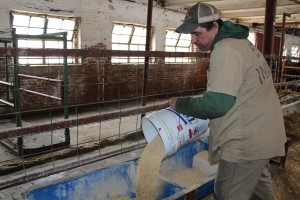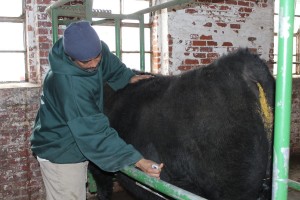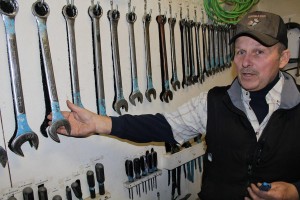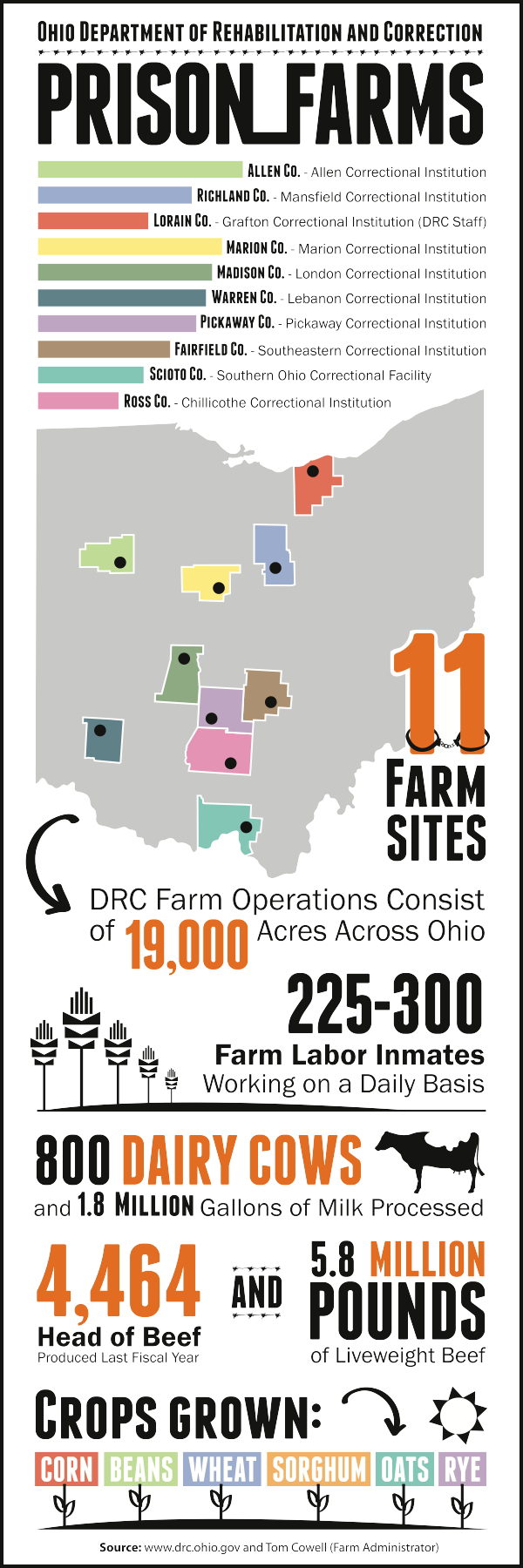MANSFIELD, Ohio — When they began working at the Mansfield Correctional Institution farm about five months ago — inmates John Carano and Zac Loman had little farming experience.
Between the two, they had helped bale some hay and work on large equipment, as well as some welding, but that was about all.
The past few months, however, they’ve been feeding and caring for hundreds of beef cattle, working on farm equipment and preparing for a new year of crops that will be used to produce the beef they and other Ohio inmates will eat.
“I didn’t realize when I came out here (that) it’s a fully functional farm,” said Loman, from Celina. “We’re always busy taking care of cows and crops. I didn’t realize how much stuff actually needed to be done on a farm.”
Carano, who is a retired heavy equipment operator from Portage Lakes, said the workload keeps his mind busy.
“It makes the time go by quick,” he said. “You’re doing something more than just sitting around and getting lazy and fat.”
More freedom
Inmates who are accepted onto the farm are given a larger, more comfortable living space known as a camp or dormitory, compared to the cells in the main part of the prison, and have more privileges.

The farm is reserved for inmates who meet the correctional system’s lowest security score — known as “security level 1” or “minimum security.” The most common offenses are related to alcohol and narcotics.
“You have freedoms out here that you don’t have inside of there,” said Loman. “You’re not treated like an inmate. We’re all humans and you’re treated more on a personal level.”
The Mansfield Correctional Institution farm is one of 11 Ohio prison farms and focuses on beef and crops, as well as produce.
The farm keeps 300-plus head of beef breeding cows and finishes an additional 500-plus head of beef feeder cattle each year.
Altogether, Ohio’s prison farms cover about 15,300 acres of farmland. They keep 900 breeding beef cows, and have at least 2,200 head of cattle on feedlots year-round.
The state’s five dairy farms have about 800 lactating dairy cows, and the state’s milk processing center, located in Pickaway County, processes about 1.8 million gallons a year.
The fattened beef cattle are processed by inmates at the Ohio Penal Industries plant in Pickaway County. The prime cuts are sold privately and the rest of the meat — about 3.2 million pounds — is redistributed to the prisons.
The Mansfield farm also manages about 1,300 acres of crops, and grows produce for the Ohio Association of Foodbanks.
The produce operation consists of 7 to 21 acres each year, and in 2012, the farm supplied about 177,000 pounds of produce for food banks.
Dave Clouser, who manages the Mansfield farm, said the experience builds inmates’ work skills, both physically and mentally.
“We’re getting them ready to go home, so we’re trying to get them socially adapted to getting back up, getting in a good pattern to go to work, accepting responsibility and honoring what their duties are,” he said.
Training inmates
But before anyone is allowed to work on the farm, Clouser and his staff must first train the inmates in the skills and safety practices they will need.
“They (often) don’t know straw from hay,” Clouser said. “They don’t know wheat from corn; they don’t know a chisel plow from a hay mower.”
Training begins with two to three days of watching videos that show how to safely do field work — operate tractors, use a chain saw, any work the inmate might do.
Usually, inmates begin as a porter in the mechanical shop, Clouser said, and move up to feeding some calves and caring for livestock, and possibly driving tractors.

On the day Farm and Dairy visited, about 24 inmates were working on the farm. On some days, depending on weather and the season, as many as 40 are working.
Security is enforced all the time, with body checks and crew counts throughout the day.
“They’re the lowest security (level), but they’re still inmates,” said Janet Tobin, labor relations officer.
Clouser said most inmates who work on the farm enjoy the freedoms they get and want to keep them. But just in case, he and his staff have adopted a three-strike policy, and after the third offense, an inmate is transferred to another area.
“We have a zero tolerance,” he said. “We pass out duties in a professional manner and we expect that in return.”
Running a farm
Inmates are allowed to do about everything that is done on a farm, including using tools like wrenches and welders, and driving tractors to and from the fields.
Each tool and each wrench is marked and must be returned to its proper place. This is a security measure to ensure nothing comes up missing.
More experienced inmates are permitted to drive tractors and do some field work, but they are limited to the field where staff sends them and they are closely monitored with radios and law enforcement vehicles.
Clouser has a map that has each field numbered and colored, and inmates are instructed exactly where they’re to go. If a tractor breaks down or something goes wrong, the inmate must stay with the equipment and is prohibited from walking back to the prison or seeking help from a residence.
The type of work being done depends on the season and the weather. When it’s fit, they work outside; when it’s not, they work on equipment and with the cattle.
“Any jobs we assign the inmates, if we wouldn’t do them, we won’t ask them to do them,” Clouser said.
The farm uses tractors and machines for big jobs, but it also relies on the abundant supply of manual labor. Instead of unloaders, they use what Clouser calls “armstrong unloaders,” or bare hands, to do things like shovel silage and move feed, as well as gardening.
During the winter, the inmates focus on the cattle and preparing the better ones to be exhibited and auctioned for seedstock.
This year, prison staff took a few of the bulls from the herd to the Ohio Beef Expo in Columbus, where they were sold. The inmates do not exhibit the animals, but they do a lot of the work in getting the animal broke so it will stand and lead.
Also in winter, the inmates focus on repairing equipment and getting ready for the new growing season. They change oil and filters, paint equipment, and just recently installed two new clutches into tractors.
Some of the equipment — especially tractors — has outgrown the storage space, and inmates are currently helping to build a new shed.
Recently, a few inmates who had mechanical backgrounds designed and constructed a piece of equipment that attaches to the front of a tractor and scoops liquefied manure. The “poop scoop” as they call it, uses a cut tire and some metal parts that inmates welded together.
“Equipment guys are the best to have,” Clouser said, noting they pay attention to gauges and take good care of the machines.
Learning process
Different inmates excel at different tasks, and some need more help than others. Clouser said if he can get them to do 60-70 percent of what a regular farmhand could do, he’s happy.
“They’ll pull a complete turnaround,” said one of Clouser’s farm coordinators. “You see it every day in a way.”
Often, the inmates’ interest in farming grows during the experience, and there are some who, when they’re released, want to go work on a farm.
The inmates are paid a small amount for their work. But their biggest gain is in education and new freedoms.
“No question goes unanswered here,” Clouser said. “If an inmate asks us a question and we don’t know what the answer is, we’ll find out and tell them.”
Clouser and his staff enjoy watching the inmates learn and better themselves. He said it’s rewarding just to see a guy understand the different kinds of wrenches and how each is used.
And, they’re teaching work ethic in general — things like “get here on time, take pride in your job, do your job,” Tobin said.
“Once you get them established, some of these guys do work seven days a week, 365 days,” said Charlie Moore, a farm coordinator who helps with the produce operation.
Hands-on learning
The experience is rehabilitating, which is exactly what corrections personnel want it to be.
“The knowledge they gain, whether they use it for farming or just in general life is invaluable,” Clouser said. “We correct them and get their attitude back to where they should be before they’re released.”
What they enjoy most is the feeling of being free, even though they’re still technically in prison.
“They (inmates) said they feel like they’re free when they get to leave the barbed wire and the high tensiles and come out here (on the farm),” said Bernie Bauer, a farm coordinator. “They just feel freedom.”
Most of the time, they haven’t been on the highway or in a vehicle unless they’re chained down to the floor, Clouser said. A ride down the road on a tractor, or in a transport van, seems like a big deal.
Staying busy
Keeping the inmates busy is an important part of keeping them out of trouble.
“You need to keep them occupied and if you don’t, you’re going to have issues,” Tobin said.
Inmates are expected to show up at the farm each day they’re scheduled to work, but there are some exceptions. One is for education.
Each inmate is required to have at least a GED before he leaves the prison, and Clouser said absences are granted if there is a schooling conflict.
Another excuse is if the inmate suffers the death of a family member.
Clouser has a background in agriculture that includes a previous position at the Agricultural Technical Institute, in Wooster, where he taught students about farm work. Now, he teaches inmates.
He also operates a part-time sheep shearing business.
“That’s how I get relaxed,” he said, half-jokingly.
Learning from others
Clouser has been farm manager at Mansfield for only a few months, but he spent much longer working under a guy who had been there for nearly 20 years — Tom Cowell.
Cowell was the farm’s previous manager, and about three months ago, he moved up to the position of farm administrator — now overseeing all of the state’s prison farms.
In talking with Cowell, it is easy to see where Clouser got his ideals and his values.
Both men deal with the same kinds of issues. Things like constant security checks, teaching people how to farm, trying to keep a large-scale operation on task, and trying to build a good work ethic in the minds of the inmates.
“Farm staff are dedicated to teaching them about farming, but, more importantly, life skills,” Cowell said.
“During my 29 years of working with inmates, I have tried to use the same teaching tools and examples that I used to raise my two sons at home: personal pride in a job well done, professionalism, quality with completed assignments, the need to show up for work on time, (and) honesty.”
Life lessons
Those are the same basic qualities that are instilled in rural generations of farm families, Cowell said, and they’re the same qualities he tries instill in the inmates.
He recalled one inmate who raised and nurtured some calves from birth all the way to finish, with the same ethic of a 4-H or an FFA student, Cowell said. And, when it came time for those cattle to go to slaughter, the inmate cried, Cowell said, just like some 4-H or FFA members might react at the end of their project.
“I was able to see the fruits of my labor,” he said.
Though the inmates are not required to stay in touch with staff after they’re released from prison, some do. Cowell has had inmates leave the prison farm and gain good employment — everything from a welder to a dairy farm manager.
Results driven
The success of the prison farm is backed up in numbers, as well.
State data show that the Ohio Meat Processing Career Center in Pickaway County has a recidivism rate of 8.7 percent, which means that’s how many inmates end up back in prison three years after their release. The overall rate for the Ohio Department of Rehabilitation and Corrections is 27.1 percent — well below the national average of 44 percent.
“One way or another, every tax payer of Ohio is going to pay for inmates,” Cowell said. “It is best to teach them real skills that enable them to enter or return to the workforce.”
As Clouser sees it, the prison farms are a win-win for many reasons. The farms provide the nourishment inmates need, and values that go hand-in-hand with hard work and producing your own food.
“They (inmates) can’t change the time they’ve got to be here, so they might as well be productive,” Clouser said. “They feel like they’re giving back to something or somebody.”
STAY INFORMED. SIGN UP!
Up-to-date agriculture news in your inbox!















Great read! Great resource.
These guys are learning more valuable “real life” skills, communications, and inter-personal relations than is taught in four years at your high-priced Ivy league Colleges, which gouge students’ pocketbooks and fill their heads with useless mush.
ROLL ON VO-ED!
This is an awesome story…thanx
Interesting story. I learned a lot about these men and what they are learning. Farm work is hard work but in the end a very rewarding job. Great job telling the story Chris Kick.
Unfortunately, Director Mohr is ending all of the farming, dairy and beef cattle operations for ODRC. It’s a sad day for the department.
They shut down the farms..its horrible now…gets not much rehabilitation in ohio prisons..all gangs and drugs. I got 2 numbers